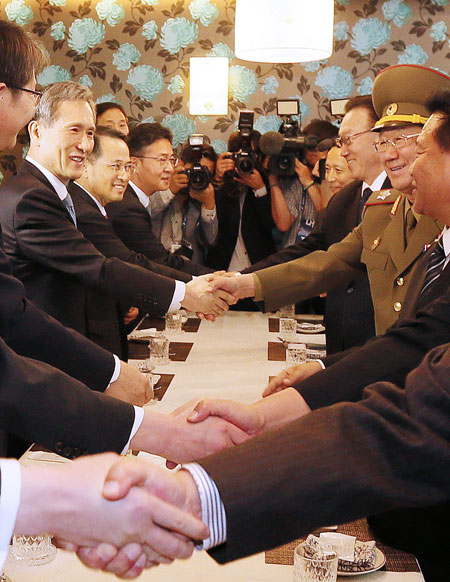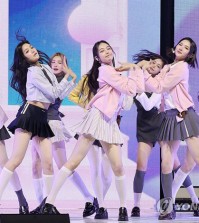- California Assembly OKs highest minimum wage in nation
- S. Korea unveils first graphic cigarette warnings
- US joins with South Korea, Japan in bid to deter North Korea
- LPGA golfer Chun In-gee finally back in action
- S. Korea won’t be top seed in final World Cup qualification round
- US men’s soccer misses 2nd straight Olympics
- US back on track in qualifying with 4-0 win over Guatemala
- High-intensity workout injuries spawn cottage industry
- CDC expands range of Zika mosquitoes into parts of Northeast
- Who knew? ‘The Walking Dead’ is helping families connect
Surprise visit by 3 top N. Korean officials: Why?

National Security Office chief Kim Kwan-jin, left, shakes hands with North Korea’s National Defense Commission Vice Chairman Hwang Pyong-so during the northern delegation’s visit to Incheon, Saturday. Hwang was accompanied by Choe Ryong-hae, first on the right, and Kim Yang-gon, third on the right, both secretaries in the reclusive regime’s ruling Workers’ Party. (Yonhap)
By Kang Hyun-kyung
A surprise visit by a powerful trio of North Korean officials leaves many questions unanswered.
First, why did not one but three top officials come?
Hwang Pyong-so, the vice chairman of the powerful National Defense Commission, could be enough for their stated mission of congratulating their team’s good performance in the Incheon Asian Games.
But Hwang was accompanied by two Workers Party secretaries — Choe Ryong-hae and Kim Yang-gon.
Their visit came at a time when their master, Kim Jong-un, has been out of public sight.
Rumors had it that he was suffering from a case of gout. He was seen limping at state functions before failing to attend the Supreme People’s Assembly plenary session.
Also some speculate that he may have heart problems.
Then, the three declined an offer to see President Park Geun-hye.
Unification Minister Ryoo Kihl-jae, who played host to the northern visitors, quoted them as saying that Kim was healthy but stopped short of explaining how he was doing.
North Korean defectors here argue that they came to erase such speculations about their leader.
Of course, it still remains to be seen whether Kim is okay.
“Simply put, they tried to send the message that Kim is fully in charge and therefore will have no problems, even though the No. 2 man is out of the country,” Kim Seong-min, a representative of Free North Korea Radio, said. “I think this is the key reason for the visit.”
“If Kim is not really sick, then why would he feel the need to send his key man to the South, days after the North harshly criticized President Park Geun-hye for her U.N. speech on unification and North Korea?” he said. “I think Kim Jong-un is overreacting to rumors about his health and this may reflect that he really does have a serious health problem.”
He noted that Hwang Pyong-so’s visit to South Korea was rare and unprecedented.
Hwang is the de facto No. 2 man in the North after leader Kim Jong-un.
Those following the news were left scratching their heads because the North Korean delegation left the South without meeting President Park.
The South Korean officials were quoted as proposing that the North Korean officials meet President Park and said they were willing to arrange this. But the North Koreans refused, citing their tight schedule.
Hong Soon-kyung, a former North Korean diplomat who defected in the early 2000s, said Kim Jong-un was willing to improve relations with South Korea and this partly explained why he sent the delegation.
“As you can see, North Korea now has no way out,” he said. “It attempted to improve relations with Japan through a series of talks recently, but found that Japan was not an easy country with which to be a partner
“People in the North would have felt there were no other countries they could rely on and therefore they concluded that it is better for them to seek a breakthrough with the South,” said Hong, who is also chairman of the Committee for the Democratization of North Korea in Seoul.
“The North is trying to send a message to the international community that it is making its own efforts to break the diplomatic stalemate by attempting to improve relations with the South.”
Asked, then, why the North Korean delegation returned home without meeting President Park, Hong said he had no idea.
An Chan-il, a North Korean-born political scientist, said that the North Korean leader appeared to be opting for diplomatic pragmatism at a time of extreme isolation in the international community.
“North Korea is weighing its options,” he said. “It could have been preparing to test-fire another inter-continental ballistic missile in November, or even for a fourth nuclear test.
“The North Korean leadership would have concluded that the timing was not suitable for such provocations and believed that they would benefit from a peace offensive.”















